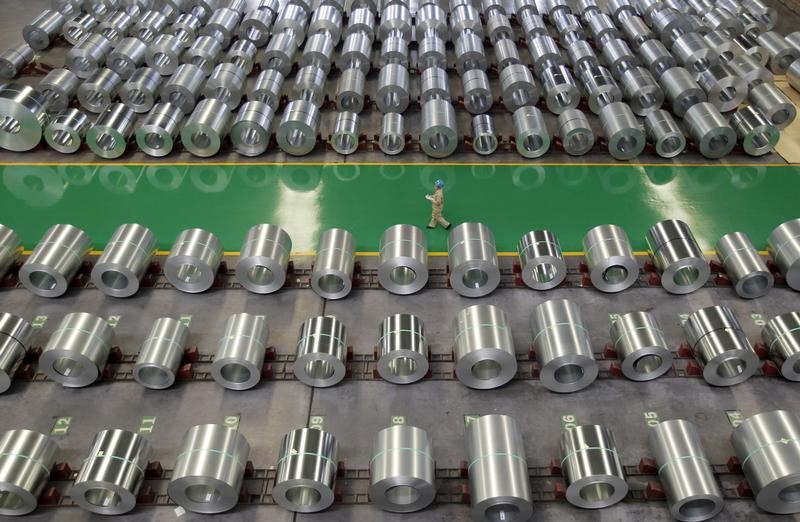(Bloomberg) -- President Donald Trump loves tariffs and hailing the jobs they create in protected industries, declaring last week that “tariffs are working” and again on Sunday that the taxes he imposed on Chinese imports “are partially responsible for our great economic results.”
If tariffs have created jobs in targeted industries such as steel, most economists argue that has been at a broader cost to the U.S. economy. But there may also be a more worrying trend emerging for Trump even as he roils markets again with threats to deploy more tariffs on China: The job bonanza in protected sectors is slowing and even going into reverse.
That illustrates the economic quandaries facing Trump -- and debated inside the White House -- as he both tries to nail down a trade deal with China and navigate the economic and political fallout from his trade wars as he enters an election year.
The strong headline figure in Friday’s non-farm payrolls report masked some weaker data related to sectors that had recorded gains thanks in part to the tariffs.
While the overall economy added 263,000 jobs in April, the number of non-supervisory jobs in manufacturing – the sort of production line jobs Trump promised to bring home - actually dipped by 4,000. Despite Trump’s tariffs, the number of Americans working in the primary metals sector -- including steel -- also fell by more than 2,000 to 381,000 people.
The latter move meant that since Trump imposed national security tariffs on steel and aluminum in late March 2018, the U.S. primary metals sector has grown by just 4,700 jobs in an economy that has added more than 2.6 million over the same period.
Employment also fell in the electrical equipment and appliance sector, where the administration has hailed the jobs created thanks to its tariffs on imported washing machines. Makers of industrial machinery -- many of whom rely on imported parts or are paying more for steel and aluminum than they used to -- employed 2,700 fewer people in April than they did in March.
Impact of Uncertainty
Monthly data can be volatile and the overall picture for U.S. manufacturing jobs remains strong. Since Trump took office in January 2017, the manufacturing sector has added 470,000 jobs, employing 12.8 million people in April, according to the data released Friday.
But plenty of companies and economists remain concerned the costs of Trump’s trade wars are piling up and risk dragging on growth as time goes on.
Matt Arnold, a machinery and industrials analyst at Edward Jones & Co. in St. Louis, says part of the story reflected in the April jobs data is the uncertainty that has accompanied the trade wars and the impact on investment.
“There’s some demand destruction taking place based on hesitance by management teams to make large scale capital investment decisions as they wait for more complete information on what the rules of the game are going to be,’’ he said. And the affected decisions include investing in people.
Companies like General Motors Co (NYSE:GM). and Caterpillar Inc (NYSE:CAT). have complained about the cost of tariffs on steel, which were imposed under Section 232 of the Trade Expansion Act of 1962. GM has said tariffs are costing it $1 billion a year while Caterpillar on Thursday said it expected its cost from tariffs to be $250 million to $350 million this year.
“It’s our impression that manufacturing has been victim of Section 232 and that could explain the reduction in jobs,’’ said Timna Tanners, a steel analyst at Bank of America Merrill Lynch (NYSE:BAC). “It’s also our impression that steel consumption has been declining over the years and Section 232 could contribute further to that decline.”
Economic Malpractice
Most economists argue tariffs amount to economic malpractice because they protect certain narrow sectors at the cost of the broader economy. A tariff on imported steel may yield more production in the U.S. in the short-term, but it also raises prices for steel, which means higher costs –- and eventually less jobs -- for businesses that use steel.
The jobs created come at a high cost. One recent study found the 1,800 jobs created as a result of Trump’s washing machine tariffs each cost consumers $815,000 a year.
Benefits also tend to be short-lived, said Mary Lovely, an economist at Syracuse University. Any shift in demand to domestic producers leads to a one-time bump in employment. “And that’s it,’’ Lovely said. “They are not going to keep growing.”
Advocates of tariffs dispute that. They argue the broader costs are both digestible for an economy like the U.S.’s that is doing well and worth it as they help protect important elements of a country’s industrial base from unfair foreign competition and encourage domestic investment.
The trade wars are, of course, only one piece of the puzzle. Fears about their impact on global growth come alongside the U.S. economy’s already prolonged recovery.
“Employers don’t want to go out and dramatically increase their workforce or add brick-and-mortar capacity at this point in the cycle,’’ said Larry De Maria, a machinery and industrials analyst at William Blair & Co. “They’re probably more inclined to invest in automation instead of dramatically increase labor.”
